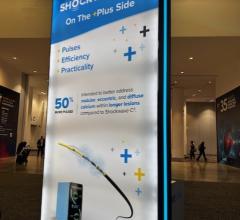October 22, 2015 — Results from the LEADERS FREE trial found that a polymer-free drug-coated stent (DCS) was superior to a bare-metal stent (BMS) in high-bleeding-risk patients treated with one month of dual antiplatelet therapy (DAPT). It was the first randomized clinical trial dedicated to this particular patient population.
Findings from the study were presented last week at the 27th annual Transcatheter Cardiovascular Therapeutics (TCT) scientific symposium, sponsored by the Cardiovascular Research Foundation (CRF). Study results were also published in the New England Journal of Medicine.
Patients at high risk of bleeding during percutaneous coronary intervention (PCI) are mostly excluded from device and antiplatelet therapy trials. Current recommendations for high-risk patients are one month of DAPT after BMS implantation and a “shortened” DAPT regimen after DES. LEADERS FREE examined the use of one month of DAPT for both types of stents, specifically studying the BioFreedom DCS from Biosensors International, which uses stent surface modification (rather than a drug delivery polymer) to elute lipophilic drug biolimus A9.
The prospective double-blind randomized study enrolled 2,466 patients with high bleeding risk during PCI. Patients were randomized 1:1 to receive a DCS (n=1,221) or BMS (n=1,211). Superiority for the primary safety endpoint (composite of cardiac death, myocardial infarction and definite/probable stent thrombosis at one year post-procedure) was met with 112 (9.4 percent) for DCS and 154 (12.9 percent) for BMS. [Risk difference -3.6 percent (95 percent CI -6.1 percent to -1 percent), HR 0.71, (95 percent CI = 0.56 – 0.91), p < 0.0001 for non-inferiority and p = 0.005 for superiority].
The results for the primary efficacy endpoint of clinically-driven TLR at one year were 5.1 percent for DCS versus 9.8 percent for BMS. [Risk difference -4.8 percent (95 percent CI = -6.9 percent to -2.6 percent), HR 0.50, (95 percent CI = 0.37 – 0.69), p<0.001 for superiority].
“Patients who have a high risk of bleeding during PCI are often excluded from stent and drug trials but constitute a rapidly growing proportion of PCI candidates and they suffer high event rates,” said lead investigator Philip M. Urban, M.D., director of interventional cardiology at La Tour Hospital in Geneva, Switzerland. “The LEADERS FREE trial clearly showed that a drug-eluting stent combined with a one-month-only DAPT course was both significantly safer and more effective than a bare-metal stent in this subset of patients.”
The LEADERS FREE trial was funded by Biosensors Europe Ltd. Urban is a paid consultant for Biosensors Europe Ltd.
For more information: www.tctconference.com


 October 31, 2025
October 31, 2025 









